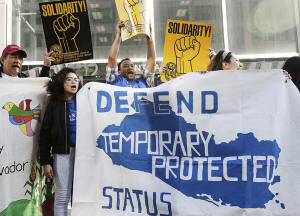Temporary status to be removed from roughly 80,000 Hondurans,
Nicaraguans after 25 years in US
[July 08, 2025]
By REBECCA SANTANA and GISELA SALOMON
WASHINGTON (AP) — The Trump administration is ending the temporary
status for nearly 80,000 Hondurans and Nicaraguans that has allowed them
to live and work in the U.S. for a quarter of a century after a
devastating hurricane hit Central America, according to federal
government notices — a move that comes as the White House pushes to make
more immigrants in the U.S. eligible for deportation.
The notices are part of a wider effort by the current administration to
make good on campaign promises to carry out mass deportations of
immigrants. It's doing this by going after people in the country
illegally or those who've committed crimes that make them eligible for
deportation but also by removing protections from hundreds of thousands
of people, many admitted under the Biden administration.
Temporary Protected Status is a temporary protection that can be granted
by the Homeland Security secretary to people of various nationalities
who are in the United States, which prevents them from being deported
and allows them to work. The Trump administration has aggressively been
seeking to remove the protection, thus making more people eligible for
removal.
Administration says conditions have changed
The Department of Homeland Security said Monday in the Federal Register
— in a notice set to become official on Tuesday — that Secretary Kristi
Noem had reviewed the country conditions in Honduras and Nicaragua. She
concluded the situations there had improved enough since the initial
decision in 1999 that people currently protected by those temporary
designations could return home.
The department estimated that roughly 72,000 Hondurans and 4,000
Nicaraguans in the U.S. are covered by the status that will now expire
in roughly two months. However, the TPS Alliance, which advocates for
immigrants covered by these temporary protections, estimated that about
40,000 Hondurans would be affected because many had obtained legal
residency through various immigration channels.

The Alliance said it filed a lawsuit Monday against Noem and DHS in the
Northern District of California. It alleged that the Trump
administration’s decision is unlawful.
Temporary Protected Status for both nationalities expired on July 5. The
notices said the protections will be terminated 60 days after the
notices are officially published in the Federal Register.
TPS is usually granted when conditions in someone’s home country make it
difficult to return. People covered by it must register with the
Department of Homeland Security. and then they’re protected from being
deported and can work.
However, it does not grant them a pathway to citizenship and the
secretary must renew it regularly, often in 18-month intervals.
When their status officially ends, Hondurans and Nicaraguans currently
covered by the Temporary Protected Status can be deported and their work
permits will be terminated if they can't find another avenue to stay in
the country.
Critics say ‘temporary’ became permanent
Critics say that successive administrations — especially the Biden
administration — essentially rubber-stamped these renewals regardless,
and people covered by what's supposed to be a temporary status end up
staying in the United States for years.
The Trump administration has already terminated TPS for about 350,000
Venezuelans, 500,000 Haitians, more than 160,000 Ukrainians, and
thousands of people from Afghanistan, Nepal and Cameroon. Some of them,
like Venezuelans, Haitians and Ukrainians, have pending lawsuits at
federal courts.
Another 250,000 Venezuelans are still protected under TPS until
September, as well as thousands of Syrians. TPS for Ethiopians expires
in December, for Yemenis and Somalians in March 2026, and for
Salvadoreans in September 2026.

[to top of second column]
|

Supporters of temporary protected status immigrants hold signs and
cheer at a rally before a conference announcing a lawsuit against
the Trump administration over its decision to end a program letting
immigrants live and work legally in the United States outside of a
federal courthouse in San Francisco, March 12, 2018. (AP Photo/Jeff
Chiu, File)

During the Biden administration, the number of people protected by
TPS grew significantly. Nearly 1 million Venezuelans and Haitians
were protected.
Jose Palma, co-coordinator at the National TPS Alliance, said the
termination announced Monday will affect people who have lived in
the United States for nearly three decades.
“They have established families. Investments. It is a community that
.... has undergone annual background checks, that has shown ... all
its contributions to this country,” Palma said. “It’s cruel what’s
happening.”
Litigation delayed ending the protections
Temporary protections for both countries were initially granted back
in 1999 following 1998's Hurricane Mitch. The first Trump
administration attempted to end the protections but they both
remained in place after litigation.
Homeland Security wrote in the federal register notice that Honduras
had “witnessed significant changes in the 26 years since Hurricane
Mitch's destruction.”
“Honduras has made significant progress recovering from the
hurricane’s destruction and is now a popular tourism and real estate
investment destination,” the department wrote. They department said
the Honduran government in January had launched a plan called
“Brother, Come Home” which aims to help Hondurans deported from the
U.S. with money and help finding a job.
Of Nicaragua, Noem wrote: “Nicaragua has made significant progress
recovering from the hurricane’s destruction with the help of the
international community and is now a growing tourism, ecotourism,
agriculture, and renewable energy leader.”
Honduras Deputy Foreign Affairs Minister Antonio García expressed
disappointment at the announcement Monday.
“They argue that Honduras has foreign investment, tourism and its
program ‘Honduran come home’ and that there are conditions to
return,” García said. But he said it was the anti-immigrant
sentiment of the Trump administration that was really behind it.
“They came to power with that and they’re getting it done for their
electorate,” he said.
Francis García has lived in the United States for almost 30 years
and has been a TPS beneficiary for 25. Her three adult children were
born in the United States, a country she considers her own.

“I feel sad, worried and scared,” said Garcia, 48, who never went
back to her country. “I am very afraid to return to Honduras. I
can’t imagine it; I wouldn’t want to.”
Like Garcia, Teofilo Martinez, 57, has lived half of his life in the
U.S, most of it under TPS protection. He arrived with nothing but
now has his own construction company and he is also a realtor.
“We ask that our good behavior and contributions be taken into
consideration,” Martinez said. "There are no conditions in Honduras
for us to return.”
___
Salomon reported from Miami. Marlon González in Tegucigalpa,
Honduras contributed to this report.
All contents © copyright 2025 Associated Press. All rights reserved |